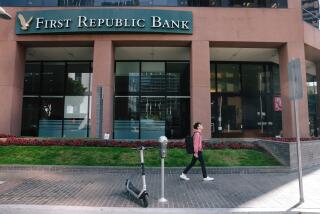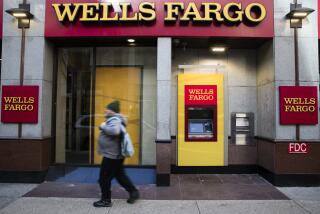Citigroup to prop up 7 ailing funds
- Share via
Citigroup Inc. said Thursday it would bail out its seven specialized investment funds known as structured investment vehicles, bringing $49 billion in assets onto its balance sheet in the biggest move yet by a bank to rescue the troubled funds.
Citigroup, the largest manager of such investment funds, followed banking titans HSBC Holdings and WestLB in deciding to save the funds and avert forced sales of the securities they own.
But by taking on the SIV assets, Citigroup will weaken its own finances, reducing the “capital ratio” that regulators monitor to gauge the bank’s ability to withstand losses on bad loans.
Citigroup’s “Tier 1” capital ratio will drop by 0.16 of a point, from 7.32% on Sept. 30, according to the New York-based company’s statement. The firm said it expected the ratio to return to its target level of 7.5% by the end of the second quarter of 2008.
The decision also raised questions about the fate of a rescue fund that major banks had been seeking to put together to handle the industry’s SIV problems. Citigroup said it “continues to support” that initiative but it wasn’t clear that the fund would materialize now, analysts said.
The banking giant’s move, announced after the stock market closed, came just two days after the company’s board named Vikram Pandit, the firm’s investment banking chief, to be chief executive. He replaced Charles Prince, who left last month under pressure as the bank reeled from losses on mortgage-related securities.
“After considering a full range of funding options, this commitment is the best outcome for Citi and the SIVs,” Pandit said in an e-mailed statement.
Those funds were created by big banks to sell short-term debt and invest the proceeds in longer-term, higher-yielding assets. Many invested in dicey mortgage securities. As that market crumbled in recent months, investors became unwilling to buy SIV debt. That raised the risk of a wholesale liquidation of the funds’ assets.
The world’s 30 SIVs have about $300 billion in assets.
Bringing SIV assets onto the sponsoring banks’ balance sheets may be better than creating potential losses for SIV creditors, said Don van Deventer, chief executive of Kamakura Corp., a provider of software to financial firms that has done work for owners of SIV liabilities.
“In the end, I think the calculation is the reputational damage would cost more than the incremental cash to bail it out,” Van Deventer said.
Citigroup shares fell 46 cents to $31.01 before the announcement. They are down 44% this year.
More to Read
Inside the business of entertainment
The Wide Shot brings you news, analysis and insights on everything from streaming wars to production — and what it all means for the future.
You may occasionally receive promotional content from the Los Angeles Times.










